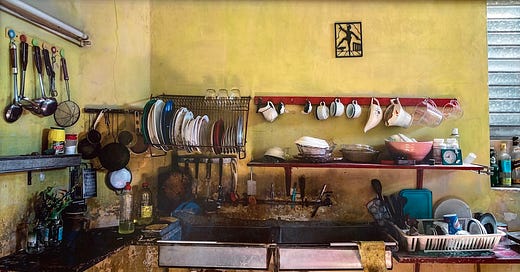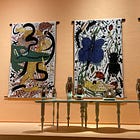In this Substack we celebrate the art and craft of Place Writing. Do you want to be inspired? Join our band of readers and writers who love everything about place and home. Subscribe now and get fortnightly posts delivered to your in-box for free.
There is so much anger and hardship in the world. With people being displaced from their homes through war and famine, through political upheaval and oppression, and through natural disasters, it behoves those of us who live in relatively safe places to be thankful for our good fortune. As I sit here in a comfortable room with clothes on my back and food in the fridge, I’m conscious that the subject of home can be a sensitive one. My mother and father both ran away as teenagers to escape poverty and physical and mental abuse, not only leaving their homes but their countries too. Knowing this, I’m amazed at their ability to make a happy home together; they brought me into the world with love and taught me how to be independent and considerate.
Researching home
Having previously qualified and practiced as an interior designer, I wanted my writing career to focus on home and place—I could draw on my design and architectural experience while conducting research into the different homes people make. As well as exploring the ins and outs of residential properties and home-making, I would take my research further to address institutionalisation, homelessness, and displacement. I pivoted slightly though, because a lot of research has been done in these sectors and, to achieve a PhD, I had to do something new. Hence, I took the less well-known path into place writing. Home is still very much at the forefront of my thinking, however, and I revisit it here now as we enter the season of heightened domesticity and family gatherings.
The importance of home
Home is not necessarily about a physical space or about staying in one place and, although it can simply be interpreted as the building we live in, the meaning of home is far more complex. It’s an intangible assembly of emotions and feelings in which love and nurturing not only exists but flourishes. For example, some people would say that their social unit is where they feel most at home. And, while a sense of belonging or attachment to home can be overwhelmingly powerful, I think it’s possible to be linked spiritually or emotionally to several places at once, or over time. When these places enter our DNA they imprint a rich patchwork of cultural heritage on us.
A Personal Perspective
Home can engender a deep-seated contentment, but it means different things to different people—it’s extremely personal. Some of you kindly shared a glimpse into your own thoughts. These include the idea of an invisible umbilical cord that always (for good or ill) connects you to home. When it’s good, home is like a safety net; it provides a nurturing space that gives you the freedom to express yourself in thought and deed. When it’s bad, it’s inhibiting and perhaps fraught with danger. Happily, the contributions below are all good:
‘Home is the place we start from, it is a foundation of nurture, creativity and self-expression — a place we can always return to and feel safe to be our fullest selves.’ Lyndsay at Story & Thread.
‘Home is when there is a vibrational match between your body mind and a place.’ Lauca at Laura’s xinsheng.
‘I have found that home, for me, is not a physical place. It’s being good with me. When I’m good with me, I’m good everywhere and with everyone.’ Unni at Self-Connection Reminders.
‘For me home is intimacy and connection with the details and rhythms of a place, an accumulation of lived experience and relationships.’ Anne at Anne of Green Places.
‘I align with a dynamic idea of ‘home’, mostly nestled in conversations, or moments of social collaborations that easily emulate when a convergence of myself and certain circumstances come around.’ Bakhtawar at Stories and States.
‘Home is where my imagination can safely roam free.’ Kathy at The Fur Cup.
‘I’ve always loved this from Gaston Bachelard: the house shelters day-dreaming, the house protects the dreamer, the house allows one to dream in peace.’ Sal from Free Words.
‘Home is where I live, love & rest with those i cherish, finding contentment & peace each day.’ Jacqui from Inner Source.
‘To me home is multifaceted—being a place of refuge and restoration, a dual mindset from which I am leaving and returning, and an emotion of deep gratitude for all that it provides.’ Justin at Those Who Wander.
‘Home is the place where I am full of contented sighs.’ Erica from Creative Dabbling.
‘Home is wherever I find comfort in solitude and joy in community.’ Jill from Memory, Time, History on Lake of the Woods.
And on the topic of decorating your home:
‘I think if I lived alone, my home would look somewhat different, but I think it is so important to compromise when living with family. It’s their home and expression, too. But sometimes that’s hard for me. :)’ Manuela from Undone.
‘My husband and I entered into a late marriage. He was 79, I was 62. We found we had many things in common in terms of intellectual and artistic perspective, but we had lived other lives alone or with others for many years. How did we find decorative agreement? It took a while, but we married our love of art and antiques and history into a unified exhibit. Our home slowly became a record of our combined history of the late 19th, as well as a symbology of what we love in art, music, and history.’ Patricia from The 20th Century and All of Us.
As a designer, I’m fascinated by the physical aspects of a structure and how it can be adjusted to help us live healthier and happier lives. And, as a place writer, I’m interested in the psychological aspects of home.
I invite you to add your own thoughts to this conversation—what does home mean to you?
Credit, References & Links:
Image above is my own; this piece of photographic art—Hearth 2—is by Leslie Osterling. There’s more about this work in my post, ‘Hearth of the Home’, link below.
Two more posts that touch on the subject of home:
If you have time, I recommend watching Taegan MacLean’s short film ‘Home’. It’s a short documentary-style film that highlights some of the emotional and practical aspects of home.







Your exploration of home's multifaceted nature is something I identify with, particularly as someone who has struggled to define what 'home' means to me.
I appreciate how you've woven together both the tangible and intangible aspects - from physical design to emotional connection. This gives me some new areas of thought to explore.
The quote about home being 'where I find comfort in solitude and joy in the community' especially struck me. It captures that delicate balance between personal space and shared experience, but it also feels like it’s lacking in my life...and perhaps one reason I struggle with defining the concept of home.
Your article reminds me that perhaps the challenge of defining home isn't a shortcoming but an acknowledgment of its complex and evolving nature. Thank you for facilitating this thoughtful dialogue about something so fundamental yet so personal.
I lived in the UK my entire life until 2 years ago when the nest emptied and my husband and I decided to do the one thing we’d always promised ourselves: live somewhere in Europe. Portugal called so here we are, yet we still find ourselves doing that distinction dance between ‘home’ (here) and ‘home home’ (the place we lived, worked and brought our kids up in in England). We feel at home here - Anne sums it up beautifully: ‘home is intimacy and connection with the details and rhythms of a place, an accumulation of lived experience and relationships.’ It’s the rhythms. And the way daily routines in this new place etch themselves into your skin. The relationships are the hardest bit, though. Nothing replaces the close family and friends you’ve travelled your life with.